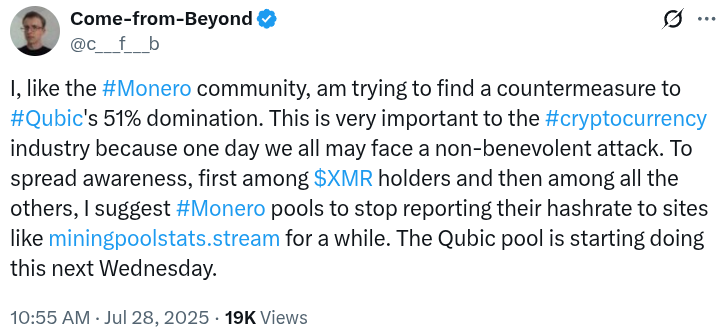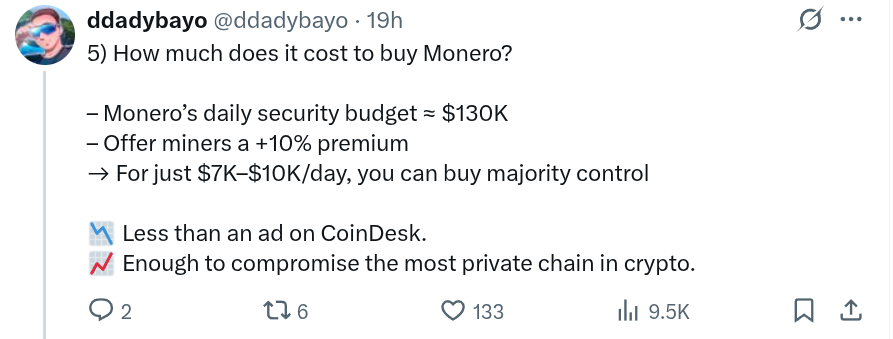Privacy-focused Monero is facing what appears to be an attempted network takeover by former top mining pool Qubic, prompting community backlash and concerns over hashrate centralization.
As of Monday, Qubic had fallen from the top spot on the Monero (XMR) mining pool rankings to seventh, according to MiningPoolStats data. After the community noticed the pool looked to be openly performing a network takeover, the pool’s hashrate plummeted until it fell into its current position as the seventh-largest XMR mining pool.
In a June 30 blog post, Qubic revealed that it had begun incentivizing Monero CPU mining via its own network. The mined XMR would then be used to fund buybacks and token burns for the Qubic ecosystem. “QUBIC miners now perform real-world tasks (Monero mining) that generate real market value, which in turn strengthens the QUBIC economy,” the post stated.
Sergey Ivancheglo, founder of crypto projects Qubic, NXT and Iota, openly admitted that his Qubic network was staging a takeover of the Monero network. In a recent X post, he explained that after getting control of most of the network’s hashrate, Qubic would reject the blocks mined by other pools.
This would lead to XMR mining becoming only profitable, or even effective, on the Qubic pool. Still, given the pool’s falling hashrate, the danger appears to be falling.
Related: Monero likely pumped 50% due to suspected $330M Bitcoin theft: ZachXBT
The covert operation phase
In a Monday X post, Ivancheglo said that from next Wednesday, the Qubic mining pool will stop reporting its hashrate — a measure previously expected to be implemented after the pool took control of most of the hashrate. This would make it much harder to determine how much of Monero’s hashrate is controlled by Qubic and assess the danger it posed to the network.
In his post, Ivancheglo claimed that he is trying to find a countermeasure to the very attack that he is orchestrating. He explained that it is important to the cryptocurrency industry “because one day we all may face a non-benevolent attack.”

Related: Japanese authorities trace Monero, arrest 18 in $670K laundering case
Monero community did not appreciate the move
Ivancheglo said in a separate X post that comments discussing his presumed location in Belarus circulated on the Monero subreddit. “I hope the head bounty won’t be collected in $XMR to avoid creating incentive to drop its price to 0,” he said. One comment makes what appears to be a thinly veiled threat to Ivancheglo:
“Do we have friends in Belarus?“
Monero is a so-called anoncoin, known for its privacy-first feature set and strong focus on anonymity. Over the years, it has become particularly popular as the currency used to pay for illegal goods and services on the so-called deep web, being accepted exclusively by nearly half of black markets.
Dan Dadybayo, an analyst at Unstoppable Wallet, explained that with 51% of the hashrate, Qubic could orphan blocks, reject transactions, delay confirmations, suppress competition and force protocol changes. He pointed out that Ivancheglo already suggested that starting on Aug. 2, Monero users should anticipate orphaned blocks and only accept transactions after 13 confirmations.

Dadybayo added that, while Qubic claims to have no intention to hurt Monero, “intent doesn’t matter.” He explained that centralization equals risk, and censorship potential is damaging to the network, concluding that incentives are a new attack vector:
“This is no longer about exploits. It’s about capital,“ he said.
Magazine: THORChain founder and his plan to ‘vampire attack’ all of DeFi

